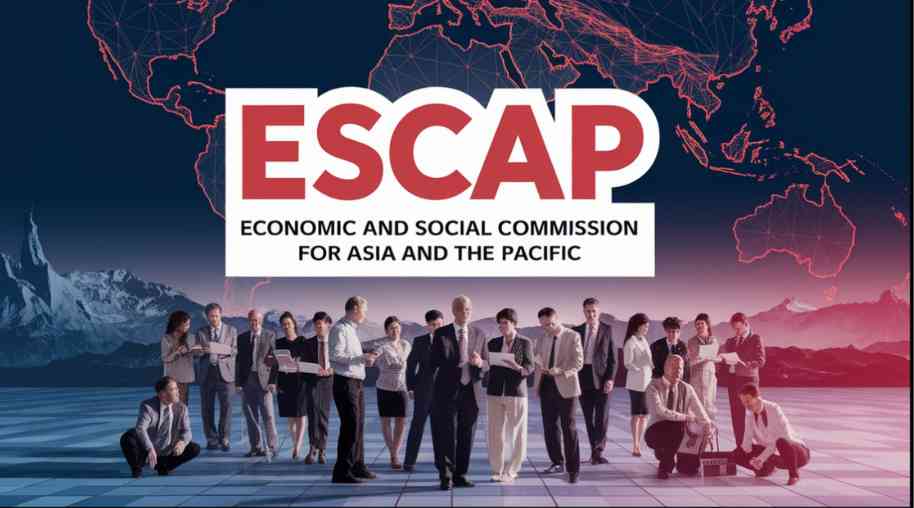ESCAP Full Form-Economic and Social Commission for Asia and the Pacific
by Shashi Gaherwar
0 2144
Economic and Social Commission for Asia and the Pacific (ESCAP): Role, Functions, and Impact on Regional Development
The Economic and Social Commission for Asia and the Pacific (ESCAP) is a regional body under the United Nations (UN) that plays a crucial role in promoting economic growth, social progress, and sustainable development in the Asia-Pacific region. Established in 1947, ESCAP serves as the leading intergovernmental platform for policy dialogue, technical cooperation, and capacity-building initiatives.

With a focus on economic development, trade, climate action, and social inclusion, ESCAP helps countries navigate challenges and leverage opportunities to achieve regional prosperity. This article explores the organization’s role, key functions, and its impact on Asia-Pacific development.
What is ESCAP?
ESCAP is one of the five regional commissions of the United Nations, with its headquarters in Bangkok, Thailand. It provides technical expertise, policy recommendations, and a collaborative platform for its 53 member states and 9 associate members in the Asia-Pacific region.
Objectives of ESCAP
ESCAP works towards achieving the United Nations Sustainable Development Goals (SDGs) by focusing on the following objectives:
- Economic Growth: Strengthening trade, investment, and financial systems for inclusive development.
- Sustainable Development: Promoting environmental sustainability, climate resilience, and energy efficiency.
- Social Inclusion: Addressing poverty, gender equality, and human rights issues.
- Regional Cooperation: Facilitating partnerships between nations to enhance connectivity and shared progress.
Key Functions of ESCAP
- Policy Advocacy and Research
ESCAP conducts extensive research on economic, social, and environmental issues, providing data-driven policy recommendations to governments and regional organizations. - Capacity Building and Technical Assistance
ESCAP supports member states with capacity-building initiatives, offering technical expertise, training programs, and development frameworks to strengthen institutional capabilities. - Economic Cooperation and Trade Facilitation
ESCAP promotes regional trade agreements, economic integration, and investment-friendly policies to enhance economic connectivity and market access. - Sustainable Infrastructure Development
The commission works on large-scale infrastructure projects, including transportation networks, digital connectivity, and clean energy solutions. - Disaster Risk Reduction and Climate Action
ESCAP helps countries build resilience against natural disasters, mitigate climate change effects, and implement policies for environmental sustainability.
Impact of ESCAP on the Asia-Pacific Region
- Advancing Economic Growth
ESCAP has played a key role in shaping trade agreements, improving investment policies, and fostering economic resilience among member nations. - Promoting Digital Transformation
Through initiatives like the Asia-Pacific Information Superhighway (AP-IS), ESCAP enhances digital connectivity, e-commerce, and technological innovation. - Strengthening Regional Connectivity
ESCAP has facilitated transnational infrastructure projects such as the Asian Highway Network and Trans-Asian Railway, promoting trade and mobility. - Driving Climate and Sustainability Initiatives
ESCAP works with governments to implement the Paris Agreement on climate change, promote renewable energy, and ensure sustainable resource management.
Challenges Faced by ESCAP
- Geopolitical Tensions: Regional conflicts and political differences can hinder cooperation and economic partnerships.
- Uneven Development: Disparities between developed and developing nations in Asia-Pacific present policy challenges.
- Climate Change Risks: The region is highly vulnerable to climate-related disasters, requiring urgent action and investment in resilience.
Future Prospects of ESCAP
With evolving global trends, ESCAP aims to:
- Strengthen digital transformation and smart economies.
- Enhance regional trade frameworks and investment strategies.
- Promote sustainable urbanization and climate-friendly policies.
- Foster gender-inclusive policies and social equity initiatives.
The Economic and Social Commission for Asia and the Pacific (ESCAP) plays a vital role in fostering economic development, social progress, and sustainability in the region. By promoting policy dialogue, regional cooperation, and innovative solutions, ESCAP continues to shape the future of Asia-Pacific’s development landscape.
As the region faces complex global challenges, ESCAP’s efforts remain essential in ensuring a resilient, inclusive, and sustainable future for all.
Further Learning Resources
If you’re passionate about building a successful blogging website, check out this helpful guide at Coding Tag – How to Start a Successful Blog. It offers practical steps and expert tips to kickstart your blogging journey!
For dedicated UPSC exam preparation, we highly recommend visiting www.iasmania.com. It offers well-structured resources, current affairs, and subject-wise notes tailored specifically for aspirants. Start your journey today!

Share:









Comments
Waiting for your comments